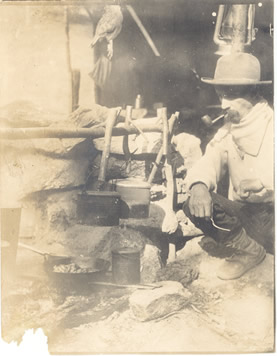Upstairs in the Hunter Library, in the Special Collections department, there lies a massive collection of documents written by and to Horace Kephart. While Horace Kephart is unfamiliar to most students on campus, his name is likely known to past Boy Scouts as he famously wrote the definitive guide on camping, The Book of Camping and Woodcraft, as well as Camp Cookery. Others may know his name from the Kephart knives. For the rest, Horace Kephart is a name to learn.

Kephart was born in Pennsylvania in 1862, in the midst of the Civil War and was a librarian for a good portion of his life, eventually becoming head librarian of the St. Louis Mercantile Library in 1890. It was here where he began to develop an interest in camping and the outdoors. Eventually his health deteriorated, and he decided to go to the ‘wilderness’ to recuperate and start over.
A prolific writer, Kephart has numerous publications ranging from articles in A Boys Life, to Field and Stream. In Western North Carolina, he is best known for his book Our Southern Highlanders, which he wrote as he traveled through the area at the turn of the twentieth century, documenting his experiences with and stories from the locals.
Among the documents preserved are his field journals and articles he wrote for various publications, most of which have been digitized and are available from Hunter Library’s online exhibit Horace Kephart: Revealing an Enigma. This collection is a rich and fascinating look into his life already, but now Special Collections can boast even more.
In 2012, Kephart’s granddaughter Libby Hargrave, gifted the library with more documents from him. These include personal letters, Christmas cards, and other private writings that, prior to the donation, had only been seen by family members. A copy of Kephart’s manuscript for a fiction novel, Smoky Mountain Magic, which was posthumously published in included in this endowment. However, an embargo was placed upon these documents, to be lifted seven years later, after the publication of Kephart’s biography. It wasn’t until this past September that the embargo was lifted, and these materials are now available to the public.
These documents help fill in the holes in Kephart’s life. One letter, written while he was still at the St Louis Mercantile Library, hints at his deteriorating mental health and subsequent desire to leave. It’s an almost eerie bit of foreshadowing knowing what we know of the man.
Horace Kephart packed up his life and left behind his wife and six children and moved out east, eventually arriving in the boughs of the Smoky Mountains in Dillsboro, where he would become famous for his camping, exploration of the area, and lobbying to create the Smoky Mountain National Park. It is believed that, by doing this, Kephart alienated his family, and understandably so. He left his entire family behind to live in the woods hundreds of miles away. For decades Kephart scholars believed this to be true.
Until recently.
With the donation of personal communication from his granddaughter scholars were finally able to get a glimpse into the private life of Kephart, learning more beyond his field journals and professional writings. Now with the embargo on these documents lifted, the public can now also learn that Kephart never truly abandoned his family. He wrote dozens of letters to his wife and dozens more to his children, particularly to his son, Leonard, who would later follow his footsteps. These letters reveal a loving man and a family concerned for his health and wellbeing, not an uncaring man who spared no thought for the family he left behind.
Those interested can peruse the collection upstairs in Hunter Library and learn more about the impressive life of the man who left his mark on the map of Western North Carolina.
Leave a Reply